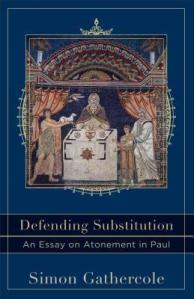Simon Gathercole. Defending Substitution: An Essay on Atonement in Paul. Grand Rapids, MI: Baker Academic, 2015. 128 pp. $19.99.
 Defending Substitution is the latest volume in Baker Academic’s Acadia Studies in Bible and Theology series. Sponsored by Acadia Divinity College and in conjunction with its Hayward Lectureship, this series is designed to offer brief, accessible volumes that present the cutting edge of academic biblical and theological scholarship in a form amenable to the nonspecialist. In Defending Substitution, Simon Gathercole offers a brief and accessible overview of the most prominent objections to substititionary atonement and provides a brief but robust positive defense of the the doctrine.
Defending Substitution is the latest volume in Baker Academic’s Acadia Studies in Bible and Theology series. Sponsored by Acadia Divinity College and in conjunction with its Hayward Lectureship, this series is designed to offer brief, accessible volumes that present the cutting edge of academic biblical and theological scholarship in a form amenable to the nonspecialist. In Defending Substitution, Simon Gathercole offers a brief and accessible overview of the most prominent objections to substititionary atonement and provides a brief but robust positive defense of the the doctrine.
Gathercole begins in the introduction by setting forth his modest aim of arguing that “Christ’s death for our sins, in our place, instead of us, is in fact a vital ingredient in the biblical (in the present discussion, Pauline) understanding of the atonement. It should be emphasized, however, that the argument here does nothing to undermine the importance of representation and participation. Rather, the point is that substitution can happily coexist with them” (14). He also briefly defines substitutionary atonement and clarifies what he will and will not address in this short volume. Specifically, the focus is narrowly on substitution as Christ’s death instead of us, in our place and not on related issues such as representation, propitiation, and satisfaction. Gathercole concludes the introduction by briefly addressing some common theological, philosophical, logical, and exegetical objections to substitution. It is exegetical objections that are the focus of this study.
In chapter 1 Gathercole addresses three prominent cases against substitution: the Tübingen understanding of representative “place-taking,” interchange in Christ, and apocalyptic deliverance. He notes the strengths of each of these positions but also points out their difficulties and weaknesses. Gathercole points out their common weakness of downplaying the importance of individual sins/transgressions. The next two chapters make a positive case for substitution, with chapter 2 focusing on 1 Corinthians 15:3 and chapter 3 focusing on Romans 5:6-8. Chapter 2 first makes a case for the central importance of Christ’s death “for our sins” in Paul, then examines the influence of Isaiah 53 on 1 Corinthians 15:3, next draws attention to the substitutionary nature of Christ’s death in 1 Corinthians 15:3, and finally looks at 1 Corinthians 15:3 as a test case for whether the Tubingen view of representative “place-taking” works. Next an excursus is devoted to responding to the objection of why Christians still die if atonement is substitutionary. Gathercole notes four elements or “kinds” of deaths (literal deaths of believers, metaphorical deaths of believers, deaths of nonbeliever, death of Christ) that need to be seen in the background in order to see how this objection is not valid.
In the final chapter, Gathercole mines the classical literature of antiquity to show that “Paul’s language about Jesus dying ‘for us’ echoes very closely the language used frequently in non-Christian literature to describe substitutionary or vicarious deaths” (85). The upshot is that “Jesus’s death is both similar and different: it is comphrehensible to a gentile as a substitutionary death like other, more familiar cases, but it is also a shocking instance of it” (86). He notes examples of conjugal love (Acelstis), friendship (Phintias and Damon), and family members (Philonides). In comparison of these classical examples with what Paul wrote in Romans 5, the point of commonality is that there is a death of one person for another. The difference is that in the case of Christ the death is for an enemy, not a spouse or friend or family member.
Defending Substitution is an excellent introduction to some of the scholarly debate surrounding the atonement and provides a brief and accessible exegetical defense of substitutionary atonement through two Pauline texts. It’s a great book for laity with academic interest in soteriology as well as beginning Bible college or seminary students. Given its intended audience and intentionally limited scope, there’s really nothing to criticize in this book.
Thanks to Baker Academic for the review copy!
Purchase: Westminster | Amazon
Vincent S Artale Jr
/ July 14, 2015Reblogged this on Talmidimblogging.
LikeLike